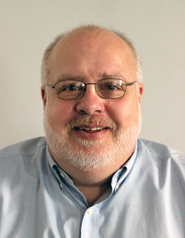Yes – Humanism and Can Be Religious and Nontheistic
 Brian Magee
Brian Magee AHA Communications Associate Brian Magee argues that the Yale Humanist Community should be a part of the university’s ministries group because humanism can be religious without being supernatural.
The decision earlier this month by Yale’s Religious Ministries office to deny membership to the Yale Humanist Community is another example of how the many ideas contained within humanism continue to be simplistically misunderstood. While the large majority of people who call themselves humanists are also non-theists, humanism also proudly makes room for those who want to retain the structure and many of the ideals of popular faith communities. The ethical overlap between these humanists and many progressive theistic religious traditions is substantial, so the desire to come together should not be difficult to fathom. To exclude one group based on a single point of disagreement goes against the stated purpose of Yale’s Religious Ministries office to foster “respect and mutual understanding among people of different faiths and cultures as well as actively promoting dialogue within the University towards that end.”
 The idea of seeing humanism in religious terms is certainly not a comfortable thought for all humanists. The “Good Without a God” phrase that the American Humanist Association makes, at a minimum, equal in importance the “good” and “without a god” parts, and there are secular humanists who are adamant that humanism never be connected to any religious framework. But these objections are, as mentioned above, based on a single point of disagreement concerning naturalism vs. supernaturalism. While this issue is indeed key to each worldview, it doesn’t need to be as divisive as it has become, especially for groups of people who have so much in common otherwise and have proven they can do good things together when they try. To shun each other over a single issue is not in line with pragmatic ideas that should be guiding all of us.
The idea of seeing humanism in religious terms is certainly not a comfortable thought for all humanists. The “Good Without a God” phrase that the American Humanist Association makes, at a minimum, equal in importance the “good” and “without a god” parts, and there are secular humanists who are adamant that humanism never be connected to any religious framework. But these objections are, as mentioned above, based on a single point of disagreement concerning naturalism vs. supernaturalism. While this issue is indeed key to each worldview, it doesn’t need to be as divisive as it has become, especially for groups of people who have so much in common otherwise and have proven they can do good things together when they try. To shun each other over a single issue is not in line with pragmatic ideas that should be guiding all of us.
In addition to these points, there is already precedence for this happening and being successful. Several of the country’s universities have humanist chaplaincies in place. The push by the Military Association of Atheists and Freethinkers for the U.S. military to accept humanist chaplains also continues and is supported by a national interfaith group.
The only reason that the Yale Humanist Community was rejected for recognition by school’s Religious Ministries office is the idea that humanism is “explicitly nonreligious.” This assertion contains the misinformed idea that religion must be deistic, which is not true. Buddhism is often seen in nontheistic terms, and Yale includes them. A religious label for humanism is just as appropriate for those who wish to use it.
The good news is that this is not the end. Chris Stedman, assistant humanist chaplain at Harvard University, has said that he thinks “there are people on both sides that see the value of working together in an intentional and formal way but are just looking for the right language to describe it.” For humanists who find meaning and support from the useful and compatible parts of a familiar religious framework, there is no valid reason why they shouldn’t be openly accepted by others where so much commonality exists. And, that is perfectly in agreement with the statement all members of the Religious Ministries group signs that states, “I pledge that I will articulate information for the purpose of sharing knowledge about my faith community and will not undermine another faith community.”
